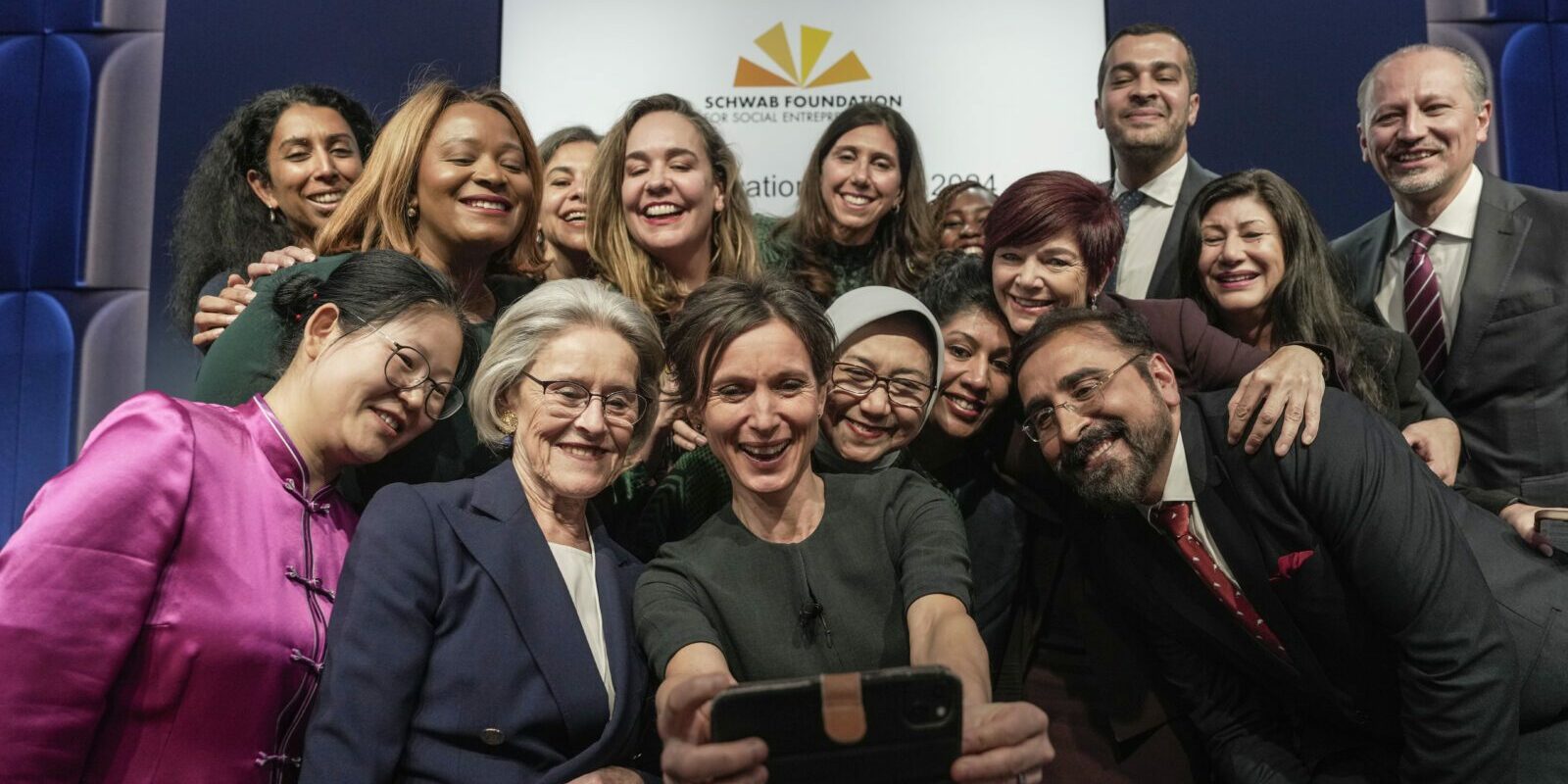Do you believe the next generation will be better off?
That was the question posed to us by Professor Klaus Schwab, founder of the World Economic Forum (WEF), whose Annual Meeting takes place each year in Davos, Switzerland. Surrounded by the other changemakers before the event’s opening ceremonies, I contemplated the question. Professor Schwab asked us to raise our hands if we did think the next generation would be better off. I’ll admit, I only tentatively and halfway raised my hand. Most in the room kept their hands down.
The data bears out this pessimism. Economic mobility in the United States is declining. According to Opportunity Insights, only half of children grow up to earn more than their parents.
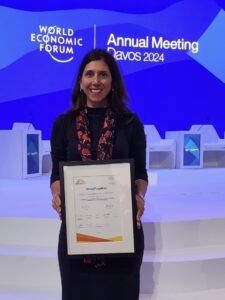
But data also shows us that solutions exist and are already making a difference in communities across the U.S. We have to believe, shared Professor Schwab. He reminded us of the theme of this year’s WEF, “Rebuilding Trust” — which means we also have to trust in humanity.
Last week at WEF, I saw much that inspired this trust. In Davos, StriveTogether was recognized by the Schwab Foundation for Social Entrepreneurship as the 2024 global leader in Collective Social Innovation. As part of this honor, I spent the week in Davos connecting with social innovators from around the world, learning about some of the most pressing global issues and networking with world leaders. It was an experience I’ll never forget and one of the highlights of my career. I had an opportunity to give remarks about StriveTogether’s impact and shared stories from communities with the many people I met.
Professor Schwab encouraged our class of social innovators to find a “North Star.” The StriveTogether Cradle to Career Network already has one — to put more young people on the path to economic mobility. Professor Schwab told us that we’d need a compass to navigate toward that North Star and radar to see storms that could pop up along the way. During our time at Davos, he said, we’d dig into some of those potential storms. What we learn from them and how to navigate around them would be key to achieving impact.
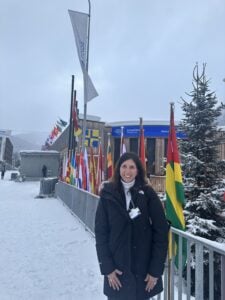
After hearing his advice, we were sent off to find our own way in a sea of conference centers, snowy sidewalks, storefronts rented by big tech companies (known as the Promenade) and security checkpoints where we would be “badged in.”
I could write a book of stories from the week. I met everyone from world leaders to activists and shook hands with former Vice President Al Gore and the “mother of the wrap dress,” fashion designer Diane Von Furstenberg. I did an interview for a South African radio show and spoke to a group of Swiss high school students. I walked thousands of steps each day, through the slush and snow in business clothes. I passed through security checks and traded my snow boots for dress shoes at the cloakroom no less than five times per day.
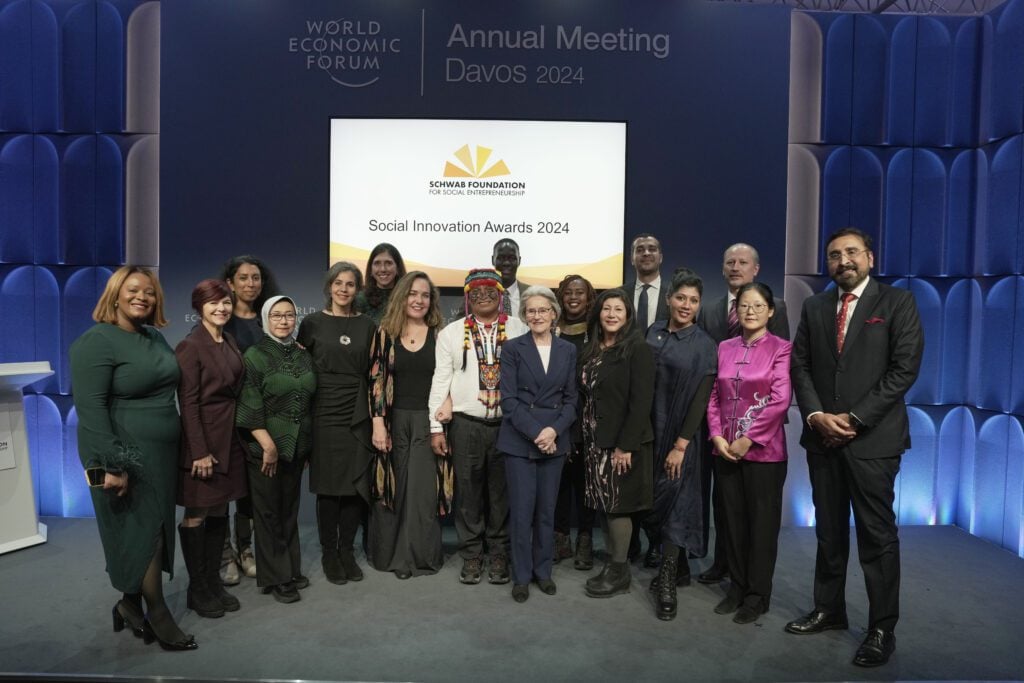
It was an incredible experience and a lot to process. As I come down from the mountains, here are three key insights I’ve brought home.
1. Systems transformation is the way.
The mission statement of the WEF is “Committed to Improving the State of the World.” And after spending a week talking about the most complex global challenges, I remain convinced that the best way to change the world is through systems change. Good programs are important, but we can’t “program our way out” of the challenges we face.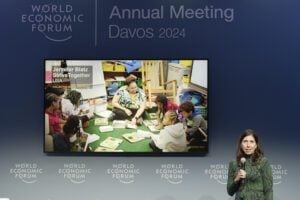
At Davos, I met social innovators tackling challenges in mental health, physical health, youth violence, empowering women, digital literacy, AI, trade, climate change and more. Regardless of what we’re working on or where we work, we share the understanding that to improve outcomes at a meaningful scale, we have to transform systems. Changing systems requires us to use data, shift mindsets, change narratives and go upstream to the root cause of challenges. Success across the Cradle to Career Network shows that this approach gets better, faster, more equitable results.
2. The world is changing fast — for better and for worse.
Many of the discussions at Davos were paradoxical in nature. Take, for example, the AI conversation. We heard stories and saw examples of how AI is used to boost productivity at work and in life, from combating climate change to improving health care diagnoses. But there’s another side to AI. The technology is adapted quickly with little regulation, so it can be misused or used to cause harm, including perpetuating biases and discrimination, fueling cyberattacks and reducing creativity.
I saw many opportunities for technology to accelerate our work to transform systems for better outcomes. AI can speed up data analysis and augment coaching. But our work is highly relational. We must be careful to use AI for work that is rote and can be automated so that we can spend even more time in relationship with our partners.
3. Rebuilding trust is about trusting in humanity.
It might seem impossible to rebuild trust in such a fractured world, especially with a surge in global conflict and upcoming divisive elections. Despite the heavy subject matter and difficult conversations, I’m leaving Davos feeling a renewed sense of optimism and trust in humanity. This was bolstered every time I connected with another social innovator. 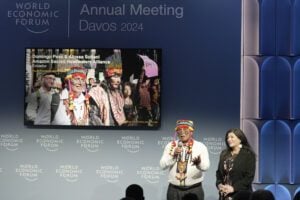
One of StriveTogether’s fellow Collective Social Innovators is the Amazon Sacred Headwaters Alliance, an alliance of 30 Indigenous nations in Ecuador and Peru working to protect 86 million acres of rainforest in the headwaters of the Amazon River. They are taking a multi-faceted strategy to save the climate, centering Indigenous values and coupling advocacy campaigns with systemic policy solutions. They’re also training the next generation of youth leaders.
The Amazon biome is critical for regulating climate, so we are all better off because of their work. There are so many similarities in their approach to the work of the Cradle to Career Network. Knowing those brilliant people are on the other side of the world working collectively to save the Amazon gives me hope and a deep trust in humanity.
I also had an opportunity to speak to a group of high school students in Switzerland. One asked about the “hierarchy of needs.” The student wondered how we can work on issues like education, mental health, youth violence and so on while we face urgent issues like climate change and food insecurity. 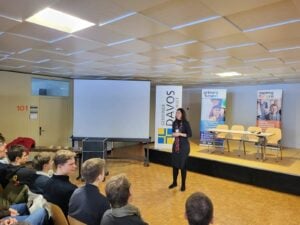
There are many intractable problems facing the world, and we each have unique expertise and contributions to make. There were more than a few times over the last week when I heard the data on climate change and wondered myself about that hierarchy, but it doesn’t mean our work is any less important. In fact, our work to ensure that every child has what they need to reach their full potential will help position young people across the U.S. to work to solve some of these intractable problems themselves.
We live in a complex world, and every human should have every opportunity to thrive. That’s the work we’re all doing in our different spaces and with our similar and very effective approaches.
If Professor Schwab asked me now whether the next generation would be better off, I’d raise my hand much more confidently. That’s because I’ve met so many brilliant people who, like the mission of the WEF, are “committed to changing the state of the world,” and I’ve seen the impact they’re having.
I’m bringing back home a sense of optimism, an acknowledgement of the challenges ahead and a belief in a collective, multi-generational, multi-sectoral approach. I encourage you to join me in bringing this global view to your own community’s work. If you need inspiration or support, visit the Training Hub Powered by StriveTogether for offerings on leading systems change, facilitating collaboration, honing strategies and more.
I trust that the work we’re doing in the StriveTogether Cradle to Career Network is the right work at the right time. And I trust in humanity that anything and everything is possible.

